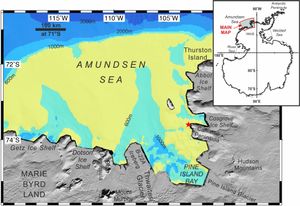Is this Wolves' most southerly fan?
From the streets of Penn to leading a five-year joint UK-USA expedition of Antarctica, could Robert Larter be Wolves' most southerly fan?
The 58-year-old marine scientist grew up on the outskirts of Wolverhampton and attended Woodfield Avenue Primary School and Wolverhampton Grammar School before going to Durham University to study Geology.
After completing a masters degree in Aberdeen he returned to the West Midlands and became a Research Associate at the Antarctic Marine Research Group at Birmingham University.
Now, Robert has left behind his partner, Suzanne, and three children to battle freezing -20C temperatures and embark on a huge Antarctic expedition - but his main worry is how he'll keep up with the Express & Star's coverage of Wolves' fixtures in the Premier League.
"I still follow the fortunes of the football team very closely and avidly read everything Tim Spiers puts out on Twitter and I find his double act with Nathan Judah very entertaining," Robert said.
"Tim Spiers' Twitter posts are my lifeline in this respect.
"The transformation over the past two seasons has been remarkable, and I think Nuno is the biggest factor in this.
"I remember watching the 2-0 win over Villa in the early part of last season on TV and thinking even then that the standard of football was the highest I had ever witnessed from a Wolves team, even compared to my earliest memories of the relatively successful team of the early 70's."

Robert started his journey on January 24, flying from Heathrow to Punta Arenas on the southern tip of Chile - where he needed to take three flights, through Sao Paulo, Brazil, and Santiago, Chile, to reach his destination.
From there, he boarded the US icebreaker Nathaniel B Palmer that then travelled to Antarctica's Thwaites Glacier where the expedition in West Antarctica aims to understand the contribution the glacier will have on the sea-level as it gradually melts.
It's estimated that if the huge glacier completed melted away it would add 80cm to the height of the world's oceans.
Robert is the chief scientist on the expedition and the Principal Investigator on the Thwaites Offshore Research (THOR) project.
This first expedition will run for 52 days and is part of a five-year-long jointly funded UK-USA research venture, where Robert will be leading the THOR project over the full five-year period.
He said: "We aim to survey and take samples from the seabed offshore from Thwaites Glacier to determine the history of its retreat and the role of incursion of relatively warm water from the deep ocean in causing that retreat.
"My specialism is marine geophysics, using methods such as sonar, seismic survey, and magnetic and gravity field measurements to study the seabed and what lies beneath it.
"The programme as a whole, the International Thwaites Glacier Consortium (ITGC), consists of eight inter-related projects.
"It is jointly funding by the US National Science Foundation and the Natural Environment Research Council in the UK, and each project is structured so that it involves collaboration between American and British researchers with two Principal Investigators, one from each country."
Despite his great adventures taking him around the world, the father-of-three is proud of his Black Country roots.
He added: "I am indeed proud of Wolverhampton and my upbringing and education in the city.
"Looking back I think the standard of education at Wolverhampton Grammar School in the 1970s, when it was still part of the state system, was incredibly high.
"The science education I received there in particular set me on my career path.
"This was a tough time in the West Midlands economically and employment prospects for young people who remained in the area were not good."





